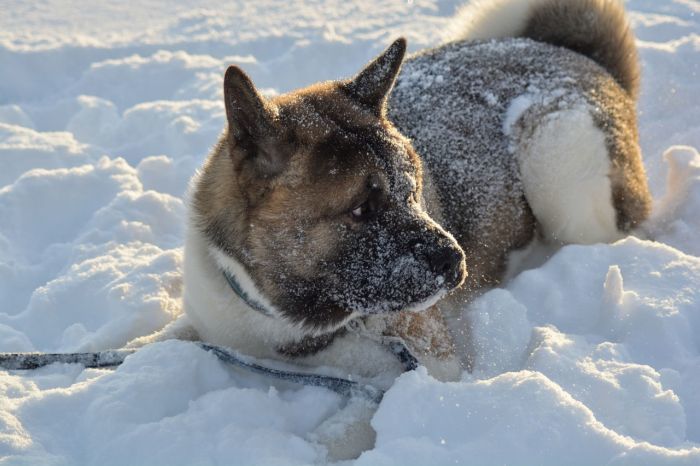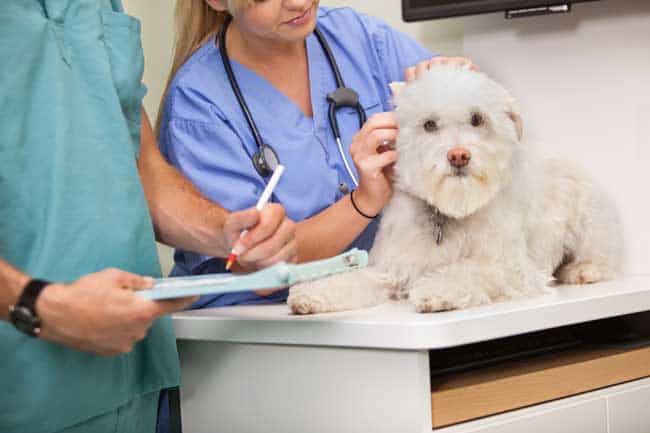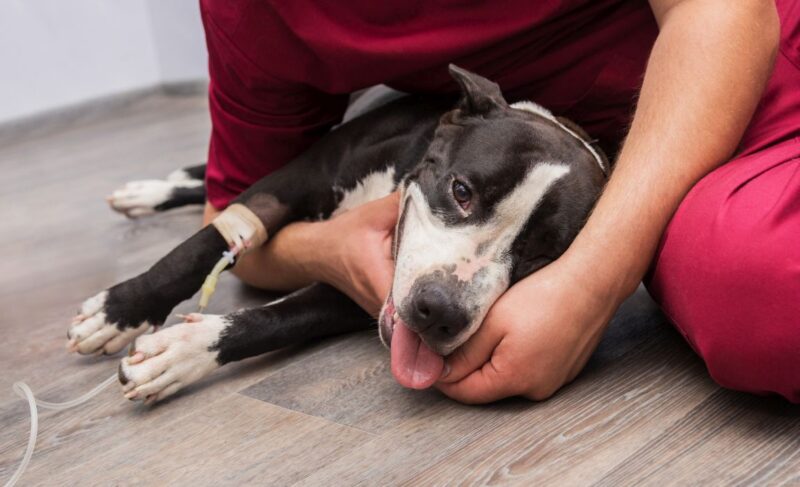Looking down at your dog, you notice that she’s shaking in her boots. It’s not that cold out, but your dog is trembling. Is this a problem? Should you be worried? Why is your dog shaking at all?
Many dogs, especially small dogs, shake frequently. There are a variety of reasons that your dog is trembling. Some of the explanations are benign, whereas others warrant an emergency vet visit.
Let’s explore the reasons behind your dog’s shaking, and what to do if you notice your dog is trembling.
Shaking and Trembling in Dogs: Key Takeaways
- Dogs may shake or tremble for a variety of reasons. In some cases, the trembling is no cause for concern, but in others, it may signal that your dog is cold or suffering from a health problem.
- Some of the health problems that will trigger shaking are quite serious. For example, shaking or trembling may be a sign of seizures or epilepsy, or it may even indicate that your dog is in severe pain.
- If your dog’s shaking is unusual or has started suddenly you’ll want to go to the vet. Because some of the causes for shaking are serious, it is wise to err on the side of caution and solicit your vet’s advice.
Should I Be Worried About My Dog’s Shaking?
If you’re concerned about your dog’s symptoms, it never hurts to get the expert opinion of a veterinarian. Consider a trip to the veterinarian’s office, or consult a certified vet online and get their opinion on the matter.
It’s especially important to get your dog in to see a veterinarian if:
- Your dog is shaking violently, stumbling, or seizing.
- Your dog is panting constantly or heavily.
- Your dog is large or fluffy. Some small dogs (like Chihuahuas and small white dogs) shake regularly, but this is quite unusual in larger or furrier breeds.
- Your dog is also displaying anxiety, diarrhea, vomiting, or signs of pain.
- Your dog recently ate something abnormal, such as trash or unfamiliar food.
- Your dog is shaking so hard or so much that she’s struggling to eat, drink, sleep, or play.
- The shaking started suddenly or is unusual for your adult dog.
In short, if your dog’s shaking seems abnormal or concerning, it’s best to go in and see the vet.
While it may be no cause for concern that your Shih Tzu trembles a lot, the same symptoms would be more concerning for a Labrador.
It’s worth remembering that there’s a wide variety in a dog’s tolerance for cold. I would be calling the vet if my husky was shaking in 50-degree weather – but I wouldn’t think twice about giving a greyhound or Doberman a jacket in the same weather!
Small breeds and slender or single-coated breeds are more prone to shivering in cool or wet environments.

As with most symptoms, it’s also important to know your dog. If shaking or trembling is unusual for your dog, or if your dog is “acting off,” it’s better to play it safe and visit the vet!
Reasons that Your Dog Shakes or Trembles (And What to Do About Them)
It can be really tricky to diagnose what’s going on with your dog, especially with a generic symptom like shaking. We’ll explore some of the most common reasons here.
1. Generalized Tremor Syndrome
Generalized tremor syndrome is quite common in small breeds like shih tzus, miniature pinschers, and Chihuahuas. Also known as shaker syndrome, this issue is characterized by full-body tremors, much like the dog is cold.
This generally will show up in adolescence, but may get worse with age.
Experts haven’t quite pinned down what causes generalized tremor syndrome, but it’s generally considered harmless. Your vet may choose to treat your pup with corticosteroids, but otherwise shaking might be a fact of life for certain dogs.

2. Muscle Weakness or Injury
Just like humans, dogs might shake or tremble if they’re in serious pain. You may also notice a single muscle quivering under strain or discomfort — this is often accompanied with a change in gait or reluctance to move in a certain way.
Older or ill dogs might shake or quiver as they struggle with their balance. For example, my father’s 15-year-old Lab’s back legs generally tremble a bit when she gets up from lying down.
Muscle fatigue — especially when it is associated with the long-term loss of muscle mass following spinal or pelvic issues — may also cause dogs to tremble or shake.
If you suspect that your dog’s shaking is a sign of pain or weakness, it’s time to visit the vet.
3. Cold
Even the fluffiest dogs can get cold — though it usually takes borderline Arctic conditions to chill a Samoyed or Akita!
If your dog is slender, thin-furred, or small and it’s below 60 degrees Fahrenheit (or even warmer if it’s windy or rainy), she might be cold!
Try warming your dog up with a cozy canine jacket, exercise, or a change of location. If the shaking doesn’t get better when your dog is warm, it’s time to check with the vet.

4. Strong Emotions
Many dogs shake from fear, anxiety, or even excitement.
My own border collie has been known to shake a bit when he realizes that he’s about to go sheep-herding (his favorite thing in the world). Excitement can make a dog shake, but so can fear. Most of the shakey dogs in shelters are quaking from fear or anxiety.
Keep an eye out for environmental triggers like the dog park, guests, feeding time, playtime, or any other external patterns related to your dog’s trembling.
You can also watch for canine calming signals, which indicate discomfort or anxiety in dogs. Keep in mind that shaking and calming signals may actually be symptoms of illness or injury.
Excitement may not be a huge problem, but it’s always a good idea to help dogs that are fearful or anxious feel more comfortable in their environment. Start by making the situation less stressful if possible, then feed your dog treats liberally to help pair the upsetting situation with good things.
Don’t worry about rewarding your dog’s fear — you’re actually helping to soothe your dog by making a bad situation better! If your dog won’t eat, it’s time to get help from an expert.
It’s worth noting that even if your dog shakes seemingly “all the time,” she might still be shaking due to anxiety. I’ve spoken to many clients who say, “Well, she isn’t shaking from being nervous. She shakes all the time.”
That dog, in fact, was actually nervous almost all the time — as evidenced by the rest of her body language!

One of the side effects of our reduced euthanasia rates in the United States (and elsewhere) is the increase of dogs that may have experienced serious psychological distress — trainers are seeing more dogs that are essentially clinically anxious than they did 10 years ago.
It’s smart to speak to a veterinary behaviorist or certified dog behavior consultant to rule out fear or anxiety if you’re having a hard time pinning down why your dog shakes. You may want to consider dog anxiety medicine and talk to your vet about some serious meds.
5. Allergic Reactions, Toxins, Bites, and Stings
Shaking in dogs is a common symptom for various sorts of poisoning. Whether your dog was stung by a bee, bitten by a snake, or poisoned with bad food, this is a serious situation.
You may not see your dog come into contact with anything dangerous. That doesn’t mean that her trembling is no big deal — scorpions, allergens, and just about anything else in this category can easily go unnoticed. This is one of the scariest reasons for a dog to start shaking uncontrollably.
Often, these situations will result in violent shaking, drooling, pacing, panting, or vomiting. If you suspect that your dog was poisoned, bitten, stung, or triggered allergically, get help from an emergency vet as soon as possible. Time is of the essence in these cases.
Call an Animal Poison Control Center (+1-888-426-4435) and try to keep information on the trigger if at all possible (but don’t put yourself in harm’s way to catch a snake, scorpion, or other creepy crawly).
6. Sickness
Almost every sickness out there can include shaking, quivering, or trembling under its list of symptoms.
From rabies to kennel cough to kidney failure, shaking isn’t a very useful symptom for diagnosing what’s wrong with your dog.
Keep close track of all of the symptoms that your dog is experiencing. Take note of your dog’s activity level, appetite, pupil size, ear position, stool, and urine. Shaking and panting is generally a sign of pain or distress and should be taken seriously. Likewise, shaking and vomiting is a cause for concern.
In particular, neurological issues and seizures — including partial seizures, which cause subtler symptoms that owners don’t always recognize as a full-blown seizure — can result in shaking and trembling. Both of these ailments can vary significantly in seriousness.
It’s almost impossible to diagnose your dog based on just a few symptoms. Your vet may need to run a series of tests, including blood work panels or imaging tests.

Dog Shaking: Sometimes It’s Normal, Sometimes It’s Not
Some dogs “just shake.”
If your dog falls in this category, you probably already know this. If your dog is new to your family and seems to shake a lot, ask the former owners (or rescue, shelter, or breeder) about it.
Other times, shaking and trembling in dogs can be a serious symptom of poisoning or illness. While it’s generally easy to rule out cold or fear as a cause of your dog’s shaking, it can be hard to pin down the other reasons. Get help from a vet or veterinary behaviorist if you’re really stuck!
***
Do you have a doggo who shakes and trembles? Has your pooch ever suffered from sudden shaking? Did you figure out why? Let us know what you found below!









Leave a Comment